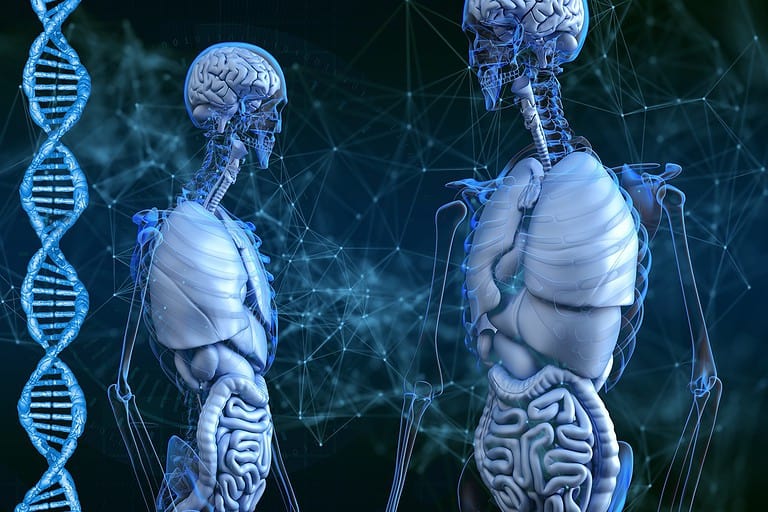The Link Between Nutrition and Mental Health: Latest Food Science Research
Recent research has shown that there is a strong link between nutrition and mental health. We are learning more and more about how the food we eat affects not only our physical health but also our mental well-being. For years, mental health was thought to be solely the result of genetics and environmental factors. However, new studies are revealing that nutrition plays a much larger role than previously thought.
Research has shown that a poor diet can exacerbate mood disorders such as anxiety and depression, as well as other neuropsychiatric conditions. On the other hand, a healthy diet rich in nutrients such as polyphenols and polyunsaturated fatty acids (PUFAs) has been reported to have favorable effects on mental health, including on cognitive performance, mood, stress reactivity, and neuroinflammation. These findings have led to the emergence of a new field of research called Nutritional Psychiatry, which explores the relationship between diet and mental health.

As we continue to learn more about the link between nutrition and mental health, it is becoming increasingly clear that what we eat plays a vital role in our overall well-being. By making informed choices about the foods we consume, we can take an important step towards improving our mental health and leading happier, healthier lives.
The Link Between Nutrition and Mental Health
As we continue to learn more about the human body and mind, it becomes increasingly clear that nutrition plays a critical role in our mental health. In recent years, a growing body of research has explored the link between what we eat and our mood, cognitive function, and risk of mental health disorders. In this section, we will explore the evidence behind this link, focusing on three key areas: diet, nutrients, and the gut microbiome.
Diet and Mental Health
Observational studies have consistently found that people who follow a healthy diet, such as the Mediterranean-style diet, have better mental health outcomes than those who consume a Western-style diet high in refined sugars, saturated fat, and processed foods. In fact, a 2021 study published in the New York Times found that a healthy diet can benefit mental health even if participants do not lose weight.
The papers suggest that nutrition has a significant impact on mental health. Edirappuli (2020) and Grajek (2022) both highlight the role of lifestyle factors, including diet, in the development and treatment of mental illness. Lim (2016) identifies specific nutritional components that may be beneficial for mental health, such as omega-3 fatty acids, phospholipids, and B vitamins. Owen (2017) emphasizes the need for further research in this area, but suggests that even modest interventions may significantly reduce the burden of mental and neurological disease. Overall, the papers collectively suggest that nutrition is an important factor to consider in the prevention and treatment of mental illness.
The effects of certain foods or dietary patterns on glycaemia, immune activation, and the gut microbiome may play a role in the relationships between food and mood. For example, a diet high in fruits, vegetables, whole grains, nuts, fish, and legumes has been associated with lower rates of depressive symptoms and depressive disorders. In contrast, diets high in fast food, soft drinks, and refined sugars have been linked to higher rates of depression and anxiety.
Nutrients and Mental Health
While a healthy diet is important, specific nutrients also play a critical role in our mental health. For example, omega-3 fatty acids found in fish, nuts, and seeds have been linked to improved brain function and reduced risk of depression. Antioxidants found in fruits and vegetables may also have anti-inflammatory effects that benefit mental health.
Vitamins and minerals, such as vitamin D and zinc, are also important for brain function and cognition. Observational studies have found that people with low levels of these nutrients are at higher risk of depression and other mental health disorders.
Gut Microbiome and Mental Health
Finally, recent research has explored the role of the gut microbiome in our mental health. The gut microbiome refers to the trillions of microbes that live in our digestive tract, which play a critical role in our immune system, metabolism, and brain function.
Studies have found that the gut microbiome may be linked to mood and mental health outcomes. For example, certain probiotics and prebiotics have been shown to improve depressive symptoms and cognitive performance. Additionally, the gut-brain axis, which refers to the communication between the gut and the brain, may play a role in the development of mental health disorders.
In conclusion, the evidence is clear that nutrition plays a critical role in our mental health. By following a healthy diet rich in fruits, vegetables, whole grains, and healthy fats, we can reduce our risk of mental health disorders and improve our overall brain health. Additionally, taking care of our gut microbiome through probiotics, prebiotics, and other lifestyle behaviors may also have a positive impact on our mental health.
Dietary Intervention for Mental Health
As we continue to learn more about the link between nutrition and mental health, researchers are exploring the effectiveness of dietary interventions for individuals with mental disorders. In this section, we will review the findings of observational studies and randomized controlled trials on dietary interventions for mental health.
Observational Studies
Observational studies have consistently found an association between a healthy diet and better mental health outcomes. For example, a study published in the American Journal of Psychiatry found that individuals who followed a Mediterranean-style diet had a lower risk of depression than those who did not follow this diet.
Another study published in the Journal of Affective Disorders found that individuals who consumed more fruits and vegetables had a lower risk of depression and anxiety. These findings suggest that a healthy diet may be an important factor in preventing and managing mental disorders.
Randomized Controlled Trials
Randomized controlled trials (RCTs) have also been conducted to evaluate the effectiveness of dietary interventions for mental health. A review of RCTs published in the Journal of Psychiatric Research found that dietary interventions, such as the Mediterranean diet and a plant-based diet, were effective in reducing symptoms of depression.
Another RCT published in the Journal of Affective Disorders found that a Mediterranean-style diet was effective in reducing symptoms of depression and anxiety in individuals with major depressive disorder. These findings suggest that dietary interventions may be a promising approach to treating mental disorders.
In conclusion, both observational studies and RCTs suggest that dietary interventions may be effective in preventing and managing mental disorders. Further research is needed to determine the optimal dietary approach for different mental disorders and to identify the underlying mechanisms that link nutrition and mental health.
Social Support and Mental Health
Our social connections and support systems can play a crucial role in maintaining good mental health. Research suggests that social support can help buffer against the negative effects of stress and improve resilience. In fact, social support has been shown to be a protective factor against depression and anxiety.
Having a strong social support network can also help individuals feel less isolated and more connected to others, which can improve overall well-being. This is particularly important for those who may be at risk for mental health issues, such as individuals who have experienced trauma or have a family history of mental illness.fatty
However, it’s important to note that not all social support is created equal. The quality of our relationships and the level of support we receive can make a big difference in our mental health outcomes. For example, having a few close, supportive relationships may be more beneficial than having many superficial connections.
In addition, the type of social support we receive can also impact our mental health. Emotional support, such as having someone to talk to about our feelings, has been found to be particularly important for mental health. Instrumental support, such as help with practical tasks, can also be helpful in reducing stress and improving well-being.
Overall, social support is an important factor to consider when it comes to mental health. Building and maintaining strong connections with others can help improve resilience, reduce stress, and improve overall well-being.

Conclusion
Through our research, we have found a growing body of evidence that suggests a link between nutrition and mental health. Studies have shown that certain nutrients, such as omega-3 fatty acids and B vitamins, may play a role in preserving normal brain function and mental well-being. Additionally, poor nutrition may be a causal factor in the experience of low mood, and improving diet may help to protect not only physical health but also mental health.
However, it is important to note that the relationship between nutrition and mental health is complex, and more research is needed to fully understand the mechanisms at play. Additionally, it is important to consider individual differences in nutrient needs and the potential for nutrient interactions.
Overall, the findings from this research suggest that a well-balanced and varied diet, accompanied by a healthy lifestyle, may be beneficial for mental health. This includes consuming a variety of fruits and vegetables, whole grains, lean proteins, and healthy fats. Additionally, reducing intake of processed and high-sugar foods may also be beneficial.
It is important to continue to explore the relationship between nutrition and mental health, as this knowledge may have important implications for the prevention and treatment of mental health conditions. By incorporating nutrition into mental health care, we may be able to improve outcomes and enhance overall well-being.







